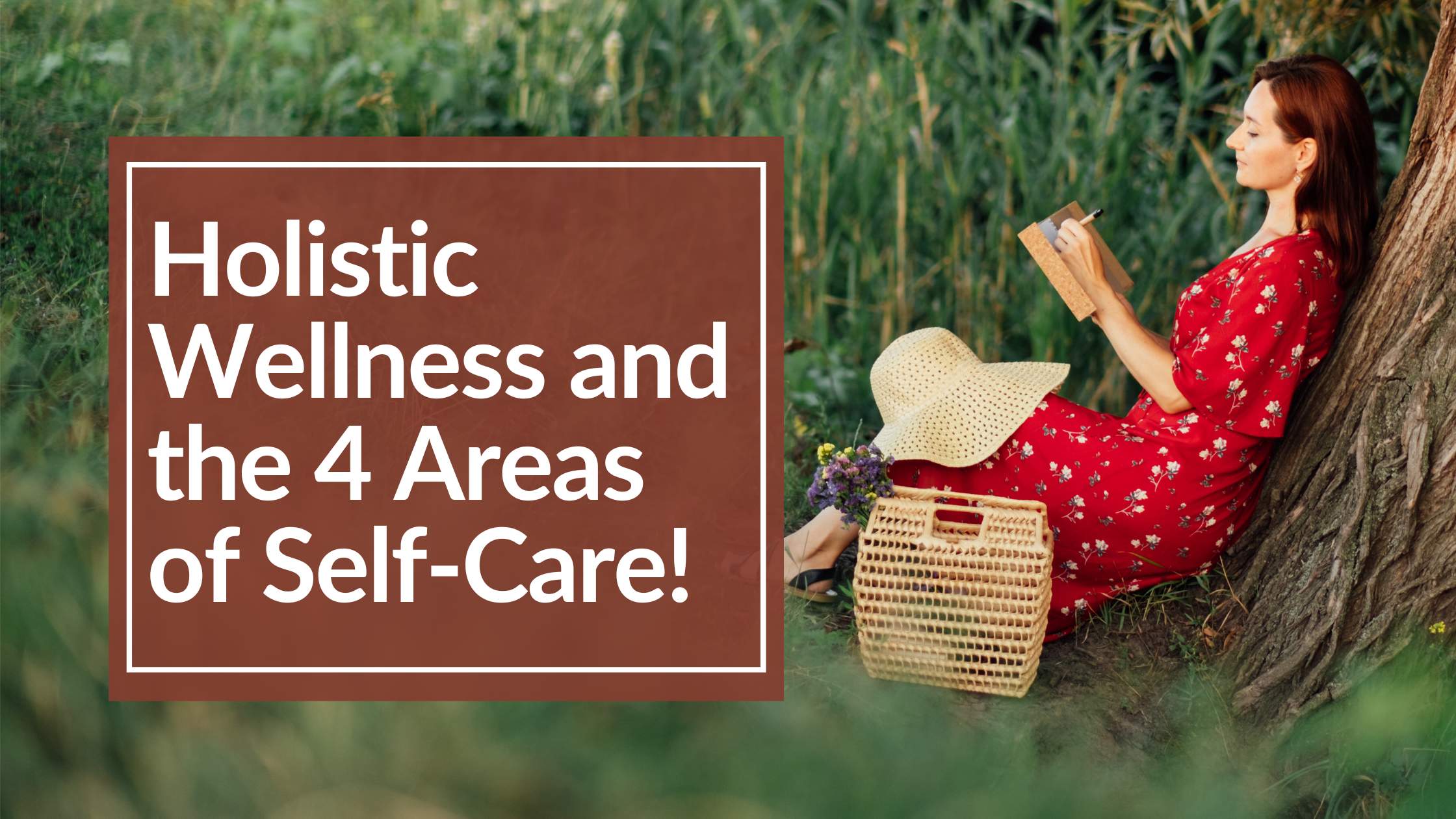
4 Areas of Self-Care to Create Holistic Wellness
Sharing the concept of self-care and the 4 areas of self-care are key to helping clients find wellness practices that make sense to them. Self-care is a term that has been around for a while in medical circles, but it’s taken on a new meaning in recent years, hasn’t it?
Like the terms detox and mindfulness, self-care has also become a buzzword that people throw around when discussing taking care of themselves. We see influencers getting mani/pedis and sharing that THIS is one of the 4 areas of self-care. It may be for that person as they work towards creating balanced health.
This, however, gives the term self-care a theme of excess and indulgence.
Self-care is so much broader than this, and it is often paired with wellness, as it should be. Adopting the 4 areas of self-care in day-to-day life is meant to increase feelings of well-being!
There are pillars of self-care that extend beyond the physical, promoting the goal of finding balance and the ability to self-nurture. Adopting these pillars as practitioners helps us to find meaningful ways to help some of our chronically ill clients find practices that work on their being in a truly holistic way.
Defining Self Care
Before Working on the 4 Areas of Self-Care, defining self-care is important! The practice of taking an active role in protecting one’s well-being and happiness, especially during periods of stress. It’s about taking care of yourself physically, mentally, and emotionally. Self-care requires us to act in an intentional manner and make space for things that make us feel good and whole as a human.
These practices are also there to keep you healthy in body, mind, and spirit. Holistic health practitioners work to keep all of these aspects at the forefront of their programs and consultations!
The History of Self-Care
The concept of self-care has been around for centuries, outside of the 4 areas of self-care, although it has taken on different forms throughout history. In ancient Greece, for example, people would visit hot springs and participate in communal baths to promote physical health. In medieval Europe, people would take long walks in the countryside to promote creating balanced health, both mentally and emotionally.
In the 1950s, the medical community started focusing on ‘person-centered care,” where a focus was placed on the person/patient so their individual needs could be placed front and center, and health decisions could be made with the individual at the top of mind.
Sounds a lot like what we do here!
The concept of self-care has become more mainstream as people began to recognize the importance of taking care of oneself in order to prevent illness and promote longevity. Self-care also promotes mental and emotional well-being.
Have you heard of the Self-Care Deficit Theory?
The Self-Care Deficit Theory was developed by Dorothy Orem, who “describes nursing as the act of helping others within the provision and management of self-care to take care of or improve human working at the house level of effectiveness.” (1)
Her goal was to improve the quality of nursing and patient care in general hospitals in her state. This concept looks to help patients (or clients):
- connect with self and others to improve health
- increase their ability to support personal well-being
- understand that caring for oneself can be hard and so personal!
According to Orem, self-care is the practice of activities people initiate and partake in on their own to maintain their life, health, and well-being.
Don’t worry, we aren’t going to go deep in medical theory of self-care here! We save theory for holistic practitioners, who want to enroll in our Certification Course!
We just love to shed some light on the history of these concepts in wellness and relate them to our everyday modern lives! With all of the stress, processed foods, toxic environment, and immune system challenges, we think self-care definitely has a place in our day-to-day lives!
Do We Really Need Self-Care?
In a word, yes. In today’s fast-paced world, it’s easy to get caught up in the hustle and bustle of everyday life and forget to take care of ourselves. We live in a culture that glorifies busyness and productivity, which can lead to burnout and exhaustion.
We see this FREQUENTLY in our general wellness clients and in our chronic illness clients, who push through their health obstacles to take care of friends and family. By encouraging self-care, we can help them, and you take a step back from the chaos and focus on your well-being.
Self-care isn’t a luxury – it’s a necessity. And yes, sometimes it CAN be a pedicure.

What Self-Care Is NOT!
We’ve already noted that self-care isn’t necessarily just about indulging in bubble baths and massages. Although a detox bath might be considered self-care!
While those things can certainly be part of a self-care practice, self-care is about taking care of oneself holistically, including physical, mental, emotional, and spiritual health.
Search the internet, and you will find self-care mentioned in pillars or areas.
The University of Kansas mentions 7 pillars of self-care.
- Mental
- Emotional
- Physical
- Environmental
- Spiritual
- Recreational
- Social
This website notes that a “well-balanced” self-care routine would encompass ALL of these pillars. Well-being depends on nurturing all areas within these pillars, and we do agree. However, in working with clients, especially when it comes to habit change, our practitioners find that guiding clients to focus on one or two areas builds more self-reliance and self-confidence.
We like to introduce self-care practices by breaking this down into four areas of self-care!
The 4 Areas of Self-Care Practice
Physical Self-Care
Physical self-care is all about taking care of your body. We know that physical health is only part of the focus in a holistic approach, but working on physical health may be the easiest place to start, especially if you are not ready to dig into your emotional wellness. The gut-brain axis connects the Nervous System and the Digestive System, and this IS an aspect of physical health that will affect your mental and emotional wellness.
This area includes so many places to target and build upon.
You could choose to work on your sleep routine, looking at your overall diet, your life stage, and its particular needs, and even digging into your gut microbiome by rebalancing the bacteria within.
Emotional Self-Care
Emotional self-care is exactly what it sounds like. It’s all about understanding and supporting your emotions. Many people have difficulty expressing their feelings, setting boundaries (especially with themselves!), and engaging in activities that make them happy. Journaling is one way to take care of your emotional wellness!
By taking care of your emotional health, you’ll be better equipped to handle stress and difficult situations. We also know that your emotional health affects your physical health. Our Practitioner, Amanda Panacea, talks about your belief system and how it impacts your Nervous System, and you can catch that right here on Instagram!
Mental Self-Care
Mental self-care stimulates your mind. This includes engaging in activities that promote mental stimulation, such as reading, learning, and problem-solving. Sudoku anyone? This type of stimulation keeps your mind healthy as you age and helps with neuroplasticity. Neuroplasticity is defined as “the ability of the nervous system to change its activity in response to intrinsic or extrinsic stimuli by reorganizing its structure, functions, or connections (1).“
Activities like these are helpful after a stroke or any brain injury (1).
Mental self-care also includes taking breaks when needed and avoiding activities that cause mental fatigue.
Spiritual Self-Care
Spiritual self-care is all about taking care of your spiritual health. This can mean different things to different people, but it generally involves engaging in activities that promote a sense of connection to something greater than oneself. This could include meditation, prayer, or spending time in nature.
It can even involve mindfulness practices.
Integrating the 4 Areas of Self-Care into Your Daily Routine
Incorporating self-care practices into your daily routine can be challenging, especially if you’re used to putting others’ needs before your own. Here are some tips to help you make self-care a priority:
- Schedule self-care time into your calendar
- Set boundaries with others to protect your self-care time
- Start small and gradually incorporate more self-care practices into your routine
- Be consistent with your self-care practices
- Remind yourself that self-care is not selfish – it’s necessary for your well-being
Common Obstacles to the 4 Areas of Self-Care
There are many obstacles that can get in the way of practicing self-care. Here are some common ones and a few tips on how to overcome them:
- Lack of time: Can you start with 5 minutes of something for YOU each day? Schedule that in your calendar.
- Guilt: If you are a caregiver, partner, or parent, you may feel guilty about taking time for yourself and yourself alone. That saying: “self-care is not selfish,” sounds corny, but it is SO NECESSARY for your long-term well-being.
- Financial barriers: There are FREE self-care practices, such as simple breathing, walking in nature, or using meditation on YouTube.
- Lack of motivation or tiredness: This is why we have you start with 5 minutes, even ONE minute of breathing. Write down your minimum commitment and make it so easy it seems almost effortless.
Start With One of the 4 Areas of Self-Care
Finding just ONE thing in ONE of the 4 areas of self-care is essential for your well-being. It can also be empowering as you take an active role in protecting your physical, mental, emotional, and spiritual health. You may even avert burnout, improve your relationships, and feel more content.
By nourishing one or all 4 areas of self-care, you are nourishing your Nervous System and emotional well-being, which is also a foundational area to support if you suffer from chronic illness.
